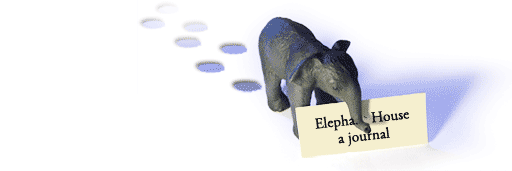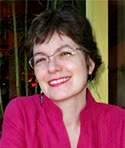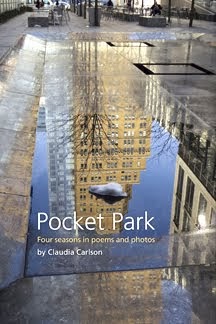This old flesh and it’s hers. I
see how wasted she is. He hair was once so black you could see blue (of
reflected sky?) in it. It is gray now and wispy-sad. Her stomach protrudes like
a pregnant woman’s. An odd melon, the frost of the vine is so thin its sap
retreating. A vine just waiting for the last frost, or is it the first? The
frost that all the farmers wait for, the frost that signals winter killing the
crops. Snow. We used to play in the snow. She was ever so young then, her teeth
and eyes were always wet and so white. And she was tall then with that
marvelous beauty mothers always have. She throws snow at me, I laugh dodging
the crisp wet. Giggling we fall down. All the snow the world, mother it is ours
then, a moment of being. No other words can express it, our day.
Walking, we are walking to the
car? Our little blue English Ford Anglia. I know it is cold out and night for
as we cross the street I feel that brown of the night. But where we are it is
light. I think that light must emanate from the bag of warm peanuts we carry.
They were so good those peanuts. I have never again tasted any so good as
those. Night, holding your hand as we walk to the car after the show. The bag
of warm peanuts.
Today you threw-up when you ate a
pretzel.
When you eat and work you carry
that bewilderment Grandaddy had before he died, when he was so so old.
He would slowly wheeze over to
his chair of 50 years and arthritically drop himself into it. He would be so
lost then. Then he would start to read his New
Yorker but always his eyes shut and his head lolled to the side. His mouth
open (pitiful yellowed teeth) and a small bit of drool would slowly make its
way to his shirt. He would sleep.
Fumbling awake, his eyes lost in
the past, he never could understand what this world now was doing. As time went
on he understood less and less. He began to look like an aged baboon. (He
always called me his “little monkey”) After awhile those bones ceased to live.
My grandfather died and there was no love for him in my heart.
Today I saw how slowly she sat
down. I saw that her body was as old as my grandfathers. She seemed so lost but
I knew there was a difference. She is alive now because her past holds no
hopeful maybes.
Oh lord, how sentimental, it
makes me sick. The nauseous outpouring. It is purge. No art in this pathetic
pity.
I do not cry for you, I cry for
myself watching you.
Soon, if you cannot eat they will
send you to the hospital. You will not leave there until you die.
When you ate your potatoes and
sour cream tonight you hardly seemed aware of the mess of food in and around
your mouth. I was embarrassed. Sin of disdain. I was embarrassed. I hate myself
for that.
When you inquired of me and my
visiting friend Lisa [Lisa Berger] if you looked horrible, I was a traitor. I
gave you the perfunctory answer, “No, no mother, you look fine.” Traitor. I
should carry a sign pronouncing me guilty of nontruth in the face of cancer.
People die ugly. I am not
expected to love the physical that is, I must love that which was. How lucky I
am that her mind is still hers. Or unlucky. She remembers her distrust and lack
of faith in me. I have earned such disappointment.
Why couldn’t I do what I should
have? Why wasn’t I even part of what you wanted me to be? I am your Judas. Your
daughter who does not keep the irritation out of her voice.
I hate you for being sick. How
dare you be dying. Why were you so damn self-destructive? I will die believing
that your 30 years of smoking were your suicide.
You are just as selfish as I am.
But I am young—you have every excuse. I have no right to ask you to die like a
saint. You die as you lived, intensely. Your life seeped with bitterness and a
strange child-like hope. How can I ever explain all your complexities and
simplicity to another person? The brilliancy and faith in the impossible. How
could a mind like yours believe in astrology? Or is it that only your mind
could justify such a thing?
Poor Lisa. I invited her here not
knowing how sick mom had gotten. I think I shall have to send her home again. I
don’t want to make her live through your death agonies. It is not right.
Perhaps you will just keep
fading. I am glad Dad is coming tomorrow.
Tomorrow, later.
-----
I had a journal I lost in the
fire, that was much more detailed about my life at 18 and the final year of my
mother’s life. I though I’d lost all the writing from that year. Then today, in
one other journal I didn’t know I had, I found the entry above.
My mother went to the hospital a
day later and died. My friend Lisa stayed with me the whole time as I waited at
home, spared that trip and guilty I didn’t go. My grandmother and “Aunt”
Shirley told me my mother essentially drowned, slipped into a coma, and only in
death looked calm. My father and stepmother came and took me to Long Island.
Neighbors broke in and stole anything of value including my mother’s lovely
silver Mexican jewelry. There were three more funerals that spring. Around the
time my mother died, my father’s brother had a heart attack in his sleep and
Dad with the police found him in bed three days later. Awful time.
The only thing I changed was the
spelling, I let spell check fix my mistakes.






